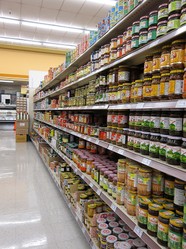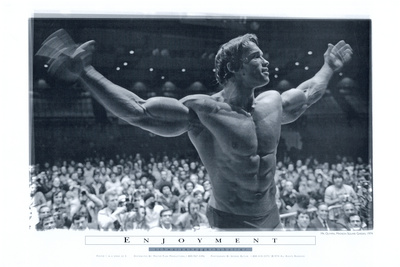Have you ever wondered about the placement of products on your local grocery store’s shelves?
Most people just go about their shopping and don’t worry about what is where. But, the placement of products on shelves is a big money business and companies and grocery stores are continually fighting about it – and it’s a ‘no holds barred’ battle.

Grocery Product Placement May Be Costing You Money
Slotting Fees are a hidden cost that may boost what you pay to fill up your market basket
Healthy Living
Grocery Products
 | Jack Link's Beef Jerky Variety Pack, 9 Count (1.25 oz Bags) - Variety Pack Includes Original and ... Plenty of protein in your diet is a key to staying energized and satisfied all day long, and it’s never been easier to work protein into your diet than with the Jack Link’s Beef... |
 | CLIF BAR - Energy Bars - Best Sellers Variety Pack - (2.4 Ounce Protein Bars, 16 Count) (Packagin... Born on a 175-mile bike ride and purposefully crafted with great-tasting, wholesome, and sustainably sourced ingredients, Clif Bar Energy bars have been fueling world-class comp... |
 | Plum Organics Stage 2, Organic Baby Food, Fruit and Veggie Variety Pack, 4 Ounce pouches (Pack of... Plum Organics Second Blends is a stage 2 organic baby food line. With blends of pure fruit and veggies, our organic baby food pouches are perfect for exposing your little foodie... |
For consumers, this battle can lead to higher prices and a lot of frustration. It seems that no sooner are the food items you want in a location where you can find them easily and get in and out of the store quickly than the shelves are rearranged and some items are no longer available.
It’s Called Slotting
Much if not all of what happens on grocery store shelves is not accidental. It’s a carefully planned – if not always consumer friendly – dance to maximize profit. While that may not be much of a secret, what is a very secretive part of what supermarkets do is demand high ‘fees’ from product manufacturers who want their items carried by the market and displayed prominently.
These fees are called “slotting” and they are meant to benefit everyone but you the consumer. The U.S. Federal Trade Commission defines slotting as “one-time payments a supplier makes to a retailer as a condition for the initial placement of the supplier’s product on the retailer’s store shelves or for initial access to the retailer’s warehouse space.” How much are we talking about? The FTC found in their limited study of slotting that “most of the surveyed suppliers reported that a nationwide introduction of a new grocery product would require $1.5 to $2 million in slotting allowances” or fees to paid to stores. Over the course of a year, with numerous ‘new’ products introduced that can add up to a great deal of money. But, most importantly, these are fees that eventually are added to the cost of the product, what the industry calls the ‘cost of doing business.’ But, all costs are eventually passed on to consumers.
Grocers claim that their business is highly competitive and they work on a slim profit margin. For them, being paid a slotting fee may make the difference between making money and going out of business. They say this helps them maintain lower prices that are passed on to their shoppers.
Millions At Stake
So, how much are we talking about here? According to one report it wouldn’t be unusual if slotting fees for items such as cereal or paper goods are in the neighborhood of $50,000. The FTC study noted that in the category of hot dogs, one grocery store charged a $5,000 slotting fee while another charged more than $20,000 (fees can vary depending on whether a grocer has a single store or it’s a supermarket chain). The FTC also estimates that slotting fees for the new products introduced each year total upwards of $2 million.
Does this really result in lower costs for consumers? Not necessarily. The product manufacturer just ads the slotting fees it is paying to the cost of the item so the consumer ends up paying for it one way or another. But, proving this is very difficult. Slotting goes farther than just paying for shelf space. The fees also vary by location, with eye level shelf space fetching premium fees.
How Does Slotting Affect You?
Besides the higher costs of products, slotting can also have an impact on what you are able to buy. Small manufacturers can’t afford to outbid large companies for shelf space. Organizations like the Independent Bakers Association have complained that slotting inhibits small companies from expanding their product line because they know they can’t afford the slotting fees.
What To Do?
Despite the questionable use and fairness of slotting fees, the government doesn’t seem poised to take action. The FTC study of several years ago is the only such governmental review and the commission was disinclined to take action, saying slotting issues need to be looked at on a case-by-case basis as complaints are made to the commission. But, in 1996 the FTC concluded that there is no evidence that slotting harms consumers. In 2001 the FTC said it was “premature” to consider issuing guidelines for slotting.
So, what are consumers to do? The simplest thing is to be aware. What you see on the shelves is designed to make you purchase the product that has paid the highest fee, not that gives you the best value. Look carefully at all the shelves; particularly those that have store brand or generic products. They are going to be less expensive but you may have to look around to find them amidst all the products that have paid-to-play for their coveted slots on your supermarket shelf.
You might also like
Health Reform Is Law; How Will It Affect Your TaxesThere's lots to know about Obamacare when it comes to your taxes. Here are so...




 The Problem With Wizzley and Amazon Associateson 10/17/2014
The Problem With Wizzley and Amazon Associateson 10/17/2014
 Happy Wife, Happy Life: Is It True?on 10/02/2014
Happy Wife, Happy Life: Is It True?on 10/02/2014
 Arborsculpture Designs Are Beautiful And Practicalon 09/30/2014
Arborsculpture Designs Are Beautiful And Practicalon 09/30/2014
 The Religious And Immoral Actson 09/23/2014
The Religious And Immoral Actson 09/23/2014


Comments
Revisiting your wizzley brought to mind a question that I'd meant to ask previously.
Do slotting fees just apply to certain bagged, bottled, canned and frozen products? I don't see much change in store arrangements of cheeses, fresh fish and meat, fresh fruits and vegetables and frozen fish. But I see re-arrangements where I have to re-learn where to find canned fish, canned and frozen vegetables and non-bakery, non-deli snacks and treats.
TheWritingCowboy, Do you know what guidelines govern marking down products as they get close to their expiration or freshness dates?